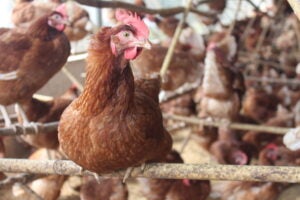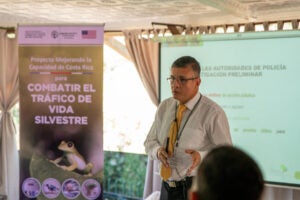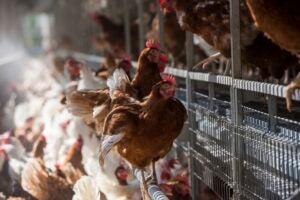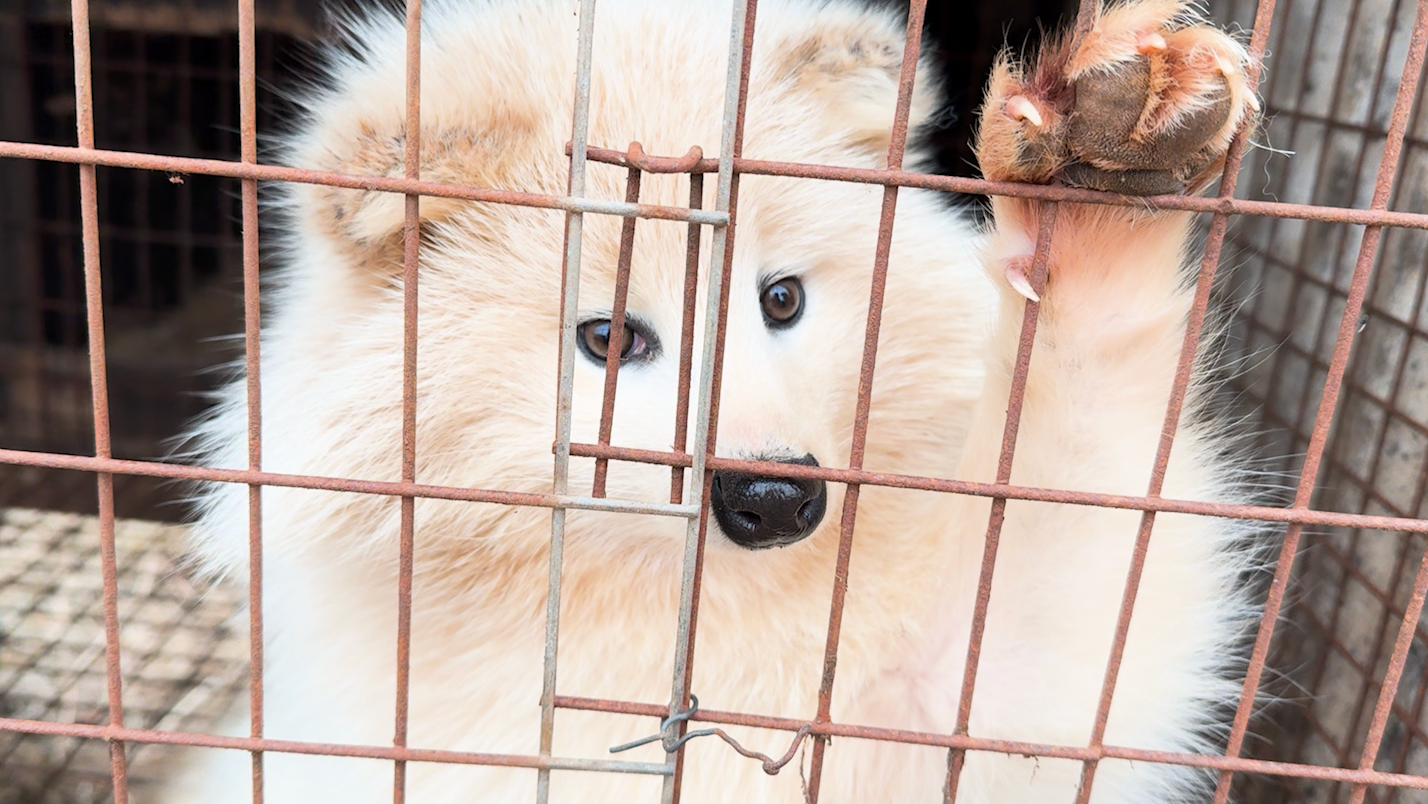
THAI NGUYEN , Viet Nam—The owner of a cat fattening farm and slaughterhouse in Thai Nguyen, where kittens were fattened up and killed for the cat meat trade, has expressed his relief at being able to leave animal cruelty behind him thanks to a charity program. Through working with Humane Society International’s Viet Nam team, the farmer has been able to close up shop and start a new life growing crops. An estimated 1 million cats a year are killed for meat in Viet Nam but recent opinion polls show that the majority of the population (71%) support a ban on both cat meat consumption and trade.
Sixty one-year-old Mr. Nguyễn Đức Thịnh, who ran the cat fattening farm and slaughterhouse for five years in Quyet Thang commune, Thai Nguyen city, received a one-off grant from HSI’s Models for Change program that enabled him to permanently close his business and transition the property to grow tea, guava and pomelo fruit for local markets instead. Mr Thịnh purchased kittens from local villages and fattened them to slaughter weight to be killed by scalding with boiling water followed by drowning. He said despite making a decent income, the guilt of causing so much suffering and becoming aware of the trade’s potential to spread deadly rabies weighed heavily on his conscience. Thanks to the collective efforts of HSI’s Viet Nam team and the provincial Department of Animal Health, he was relieved to be able to leave the cat meat trade behind him.
Mr. Thịnh said: “When I started the business five years ago, I had no idea that the cat and dog meat trades were linked to the spread of rabies and other diseases, and I never expected to be so affected by the suffering of the cats. Now that I am aware, I feel an immense sense of regret and I am hugely relieved to leave it all behind me. Scalding and drowning is a terrible death for any animal and I hate to think how many thousands of cats have endured that fate because of my business. I’m looking forward to leading a peaceful life growing crops instead. The cat and dog meat trades are a risk to the health of both people and animals, so I’m very proud to be a part of HSI’s Models for Change program. Without them my new life would never have been possible.”
HSI’s team in Viet Nam rescued 20 young cats—including some who had been born on the farm in filthy conditions—as part of the closure. The HSI team took the cats to a custom-made sheltering facility at Thai Nguyen University of Agriculture and Forestry to receive medical care. Sixteen of the cats will be flown to the charity’s care and rehabilitation center in the United States to seek adoptive families, while the kittens will join them once they are old enough to fly with their mother.
Mr Thịnh’s farm is the sixth dog or cat meat trade business to permanently close as part of HSI’s Viet Nam Models for Change program since it launched in the country in 2022. The charity has operated Models for Change in South Korea since 2015, succeeding in seeing a similar scheme become part of the legislative ban on the industry passed by South Korea’s National Assembly in January this year. HSI hopes South Korea’s ban creates a blueprint for change that the government in Viet Nam can follow.
Quang Nguyen, HSI’s Viet Nam companion animals and engagement program manager, said: “Our Models for Change program here in Viet Nam is demonstrating that cat and dog meat business owners like Mr Thịnh can be part of the solution to end these cruel and dangerous trades. Trafficking and slaughtering millions of cats and dogs for meat each year, whether they are stolen from the streets, smuggled into the country, or transported on journeys sometimes spanning the county from fattening farms, jeopardises human health and causes immense animal suffering. South Korea’s recent ban on dog meat farming and sales proves that legislative change is possible, and we believe the health of Viet Nam’s citizens, as well as the welfare of its cats and dogs, would be safeguarded by a similar ban in this country.”
Most cats killed for meat in Viet Nam are strays and pets snatched while roaming the streets. Traders use food baits to lure the cats into homemade spring-loaded snares. Others are smuggled in on trucks and buses from surrounding provinces as far south as Ho Chi Minh City and even internationally from countries such as Cambodia. Those who survive these ordeals go on to be crammed together in cages and loaded onto trucks to be driven incredible distances across Viet Nam, often travelling for more than 24 hours without rest, food or water in suffocating conditions, with many dying along the way. Cat fattening farms like Mr Thịnh’s are far less common; the kittens are sold to farms at such a young age, they are highly vulnerable to disease and many succumb to the squalid conditions.
The link between the dog meat trade and the spread of deadly rabies has been well established by the World Health Organization and others, but cats are also susceptible to rabies and so the combined trades undermine rabies elimination efforts. This is another compelling driver to end the trade, in addition to the suffering and killing of 5 million dogs and 1 million cats a year for meat in Viet Nam.
Cat meat trade facts
- Cat meat dishes called “thịt mèo” (cat meat) and “tiểu hổ” or “little tiger” are particularly common around the capital, Hanoi, and in northern provinces.
- Northern Viet Nam shares a large border with Southern China where cat meat and cats are readily available and easily trafficked. In 2015 a truck loaded with thousands of cats in bamboo crates being trafficked from China was intercepted in Viet Nam. Despite animal groups pleading to offer help, the authorities buried the cats alive. In 2017, Vietnamese officials stopped a truck transporting5 tons of rotting cat and chicken carcasses which were on their way to the cat meat consuming “hotspot” of Thai Binh province. In 2018, nine cooler boxes containing almost one ton of frozen cats was intercepted between Dong Nai province in the south and Thai Binh province in the north.
- In 1998, the Prime Minister issued a directive banning the hunting, slaughtering and consumption of cats in efforts to encourage cat ownership to keep the rat population under control. However, little to no action was taken to combat the trade, and the directive was eventually repealed in 2020.
- A Nielsen opinion poll conducted in October 2023 and commissioned by HSI shows that cat meat is consumed by a relative minority of the Vietnamese population (21%). By far the top reasons for not consuming dog and cat meat are a belief that they are companion animals and an aversion to animal cruelty.
- The poll also shows an astonishing 87% of people have either had a pet stolen or have an acquaintance whose pet has been stolen. Pet theft is becoming a growing societal issue in Viet Nam, with the increasing animal-loving and pet owning population frustrated with the lack of law enforcement to protect their animals from unscrupulous thieves and traders.
Download video and photos of the cat slaughterhouse closure operation HERE
ENDS
Media contacts:
- HSI Global: Wendy Higgins, director of international media: whiggins@hsi.org
- HSI in Việt Nam: Thẩm Phượng, director: phuongth@hsi.org
Nielsen’s online survey of Vietnamese citizens was conducted in September 2023 with recipients aged between 25 – 60 years old, with a total sample size of 800 and a margin of error of +- 2.53%.








